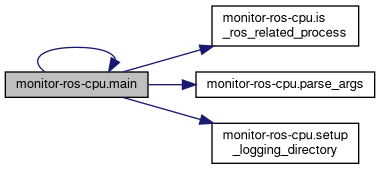Functions | |
| def | parse_args () |
| def | setup_logging_directory (output_dir) |
| def | is_ros_related_process (proc_info, cmdline) |
| def | get_process_environment (pid) |
| def | main () |
Variables | |
| dictionary | ROS_KEYWORDS |
| dictionary | EXCLUDE_KEYWORDS = {"code", "chrome", "firefox", "vscode", "gnome"} |
Function Documentation
◆ get_process_environment()
| def monitor-ros-cpu.get_process_environment | ( | pid | ) |
Try to get ROS-related environment variables for a process
Definition at line 106 of file monitor-ros-cpu.py.
107 """
108 Try to get ROS-related environment variables for a process
109 """
110 try:
111 proc = psutil.Process(pid)
112 env = proc.environ()
113 ros_env = {k: v for k, v in env.items() if "ROS" in k}
114 return bool(ros_env)
115 except (psutil.NoSuchProcess, psutil.AccessDenied):
116 return False
117
118
def get_process_environment(pid)
Definition: monitor-ros-cpu.py:106
◆ is_ros_related_process()
| def monitor-ros-cpu.is_ros_related_process | ( | proc_info, | |
| cmdline | |||
| ) |
Check if a process is ROS-related based on name and command line
Definition at line 88 of file monitor-ros-cpu.py.
89 """
90 Check if a process is ROS-related based on name and command line
91 """
92 # Convert process information to lowercase for case-insensitive matching
93 name_lower = proc_info["name"].lower()
94 cmdline_lower = cmdline.lower()
95
96 # Check exclusions first
97 if any(excl in name_lower or excl in cmdline_lower for excl in EXCLUDE_KEYWORDS):
98 return False
99
100 # Check for ROS-related keywords in process name and command line
101 return any(
102 keyword in name_lower or keyword in cmdline_lower for keyword in ROS_KEYWORDS
103 )
104
105
def is_ros_related_process(proc_info, cmdline)
Definition: monitor-ros-cpu.py:88
Referenced by main().
Here is the caller graph for this function:

◆ main()
| def monitor-ros-cpu.main | ( | ) |
Definition at line 119 of file monitor-ros-cpu.py.
120 args = parse_args()
121
122 # Add any additional include patterns from command line
123 if args.include_pattern:
124 additional_patterns = set(args.include_pattern.split(","))
125 ROS_KEYWORDS.update(additional_patterns)
126
127 output_file = setup_logging_directory(args.output_dir)
128
129 with open(output_file, mode="a") as file:
130 writer = csv.writer(file)
131 writer.writerow(
132 [
133 "Timestamp",
134 "PID",
135 "Process Name",
136 "CPU (%)",
137 "Memory (%)",
138 "Command Line",
139 "Total CPU (%)",
140 "Total CPU Num",
141 "Total Memory (%)",
142 "Total Memory (GB)",
143 ]
144 )
145
146 print(f"Starting to monitor the CPU usage data and saving to: {output_file}")
147
148 # Total CPU and memory size in GB doesn't change
149 total_memory_gb = psutil.virtual_memory().total / (1024**3)
150 total_cpus = os.cpu_count()
151
152 while True:
153 timestamp = datetime.now().strftime("%Y-%m-%d %H:%M:%S.%f")[:-3]
154 total_cpu_percent = psutil.cpu_percent(interval=None)
155 total_memory_percent = (
156 psutil.virtual_memory().percent
157 ) # Get total memory usage
158
159 for proc in psutil.process_iter(
160 ["pid", "name", "cpu_percent", "memory_percent", "cmdline"]
161 ):
162 try:
163 cmdline = (
164 " ".join(proc.info["cmdline"]) if proc.info["cmdline"] else ""
165 )
166
168 pid = proc.info["pid"]
169 name = proc.info["name"]
170 cpu_percent = proc.info["cpu_percent"]
171 memory_percent = proc.info["memory_percent"]
172
173 writer.writerow(
174 [
175 timestamp,
176 pid,
177 name,
178 cpu_percent,
179 memory_percent,
180 cmdline,
181 total_cpu_percent,
182 total_cpus,
183 total_memory_percent,
184 total_memory_gb,
185 ]
186 )
187
188 except (
189 psutil.NoSuchProcess,
190 psutil.AccessDenied,
191 psutil.ZombieProcess,
192 ):
193 continue
194
195 time.sleep(1)
196
197
def setup_logging_directory(output_dir)
Definition: monitor-ros-cpu.py:80
References is_ros_related_process(), main(), parse_args(), and setup_logging_directory().
Referenced by main().
Here is the call graph for this function:

Here is the caller graph for this function:

◆ parse_args()
| def monitor-ros-cpu.parse_args | ( | ) |
Definition at line 64 of file monitor-ros-cpu.py.
65 parser = argparse.ArgumentParser(description="Monitor CPU usage of ROS2 nodes")
66 parser.add_argument(
67 "--output-dir",
68 "-o",
69 default="carma-cpu-usage-logs",
70 help="Directory to store output files (default: carma-cpu-usage-logs)",
71 )
72 parser.add_argument(
73 "--include-pattern",
74 "-i",
75 help="Additional comma-separated patterns to include in process filtering",
76 )
77 return parser.parse_args()
78
79
Referenced by main().
Here is the caller graph for this function:

◆ setup_logging_directory()
| def monitor-ros-cpu.setup_logging_directory | ( | output_dir | ) |
Definition at line 80 of file monitor-ros-cpu.py.
81 if not os.path.exists(output_dir):
82 os.makedirs(output_dir)
83 timestamp = datetime.now().strftime("%Y_%m_%d-%H_%M_%S")
84 filename = f"cpu_usage_ros2_nodes_{timestamp}.csv"
85 return os.path.join(output_dir, filename)
86
87
Referenced by main().
Here is the caller graph for this function:

Variable Documentation
◆ EXCLUDE_KEYWORDS
| dictionary monitor-ros-cpu.EXCLUDE_KEYWORDS = {"code", "chrome", "firefox", "vscode", "gnome"} |
Definition at line 61 of file monitor-ros-cpu.py.
◆ ROS_KEYWORDS
| dictionary monitor-ros-cpu.ROS_KEYWORDS |
Initial value:
1= {
2 "ros",
3 "node",
4 "rviz",
5 "rqt",
6 "/opt/ros/", # ROS installation path
7 "/opt/carma/", # CARMA ROS installation path
8 "roscore",
9 "rosmaster",
10 "roslaunch",
11 "rostopic",
12 "rosnode",
13 "rosbag",
14 "ros2",
15 "ros1_bridge",
16 "rmw", # ROS middleware
17 "fastrtps",
18 "cyclonedds",
19 "rclcpp",
20 "rclpy",
21 "noetic",
22 "foxy",
23 "humble",
24}
Definition at line 34 of file monitor-ros-cpu.py.